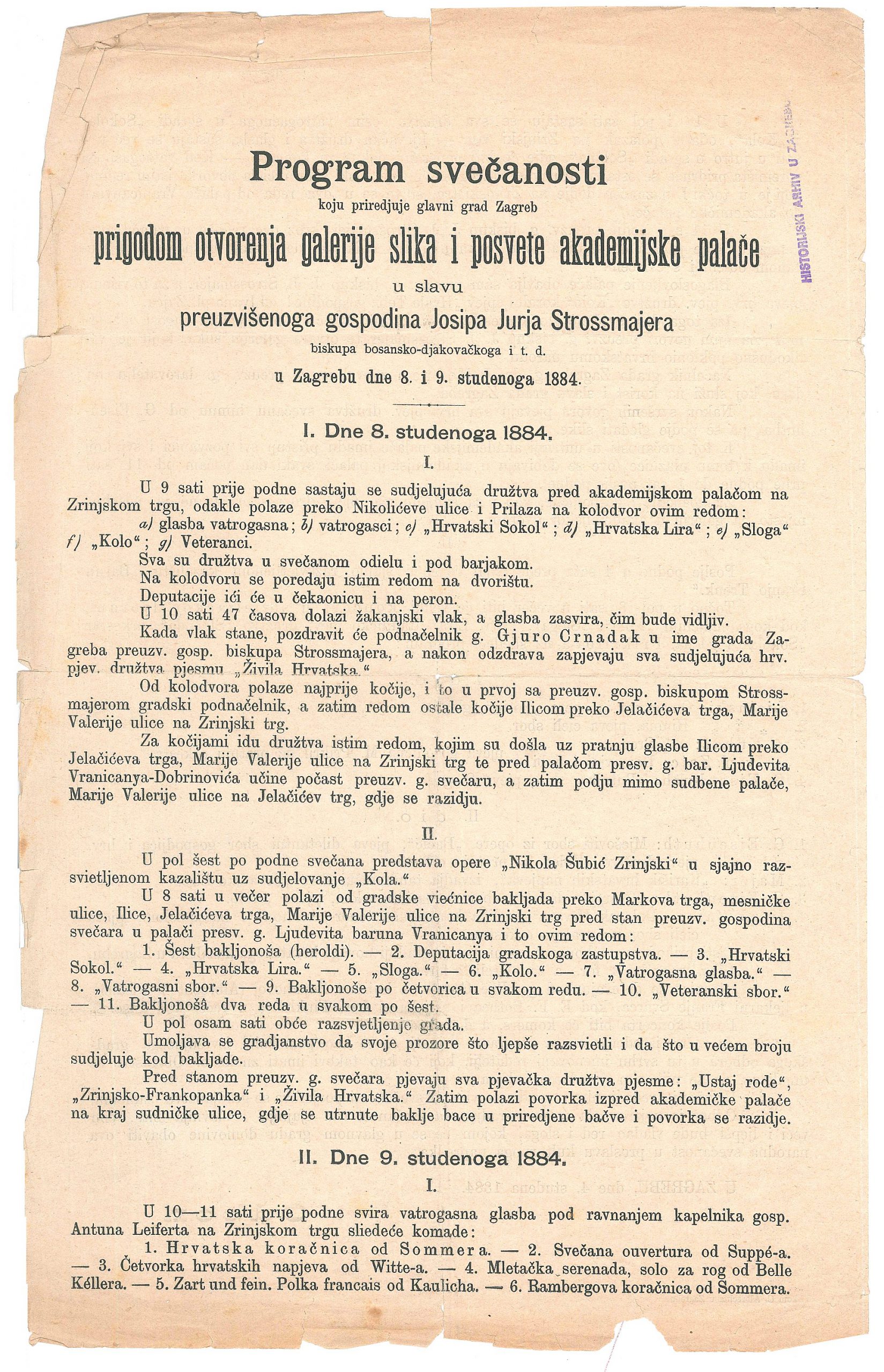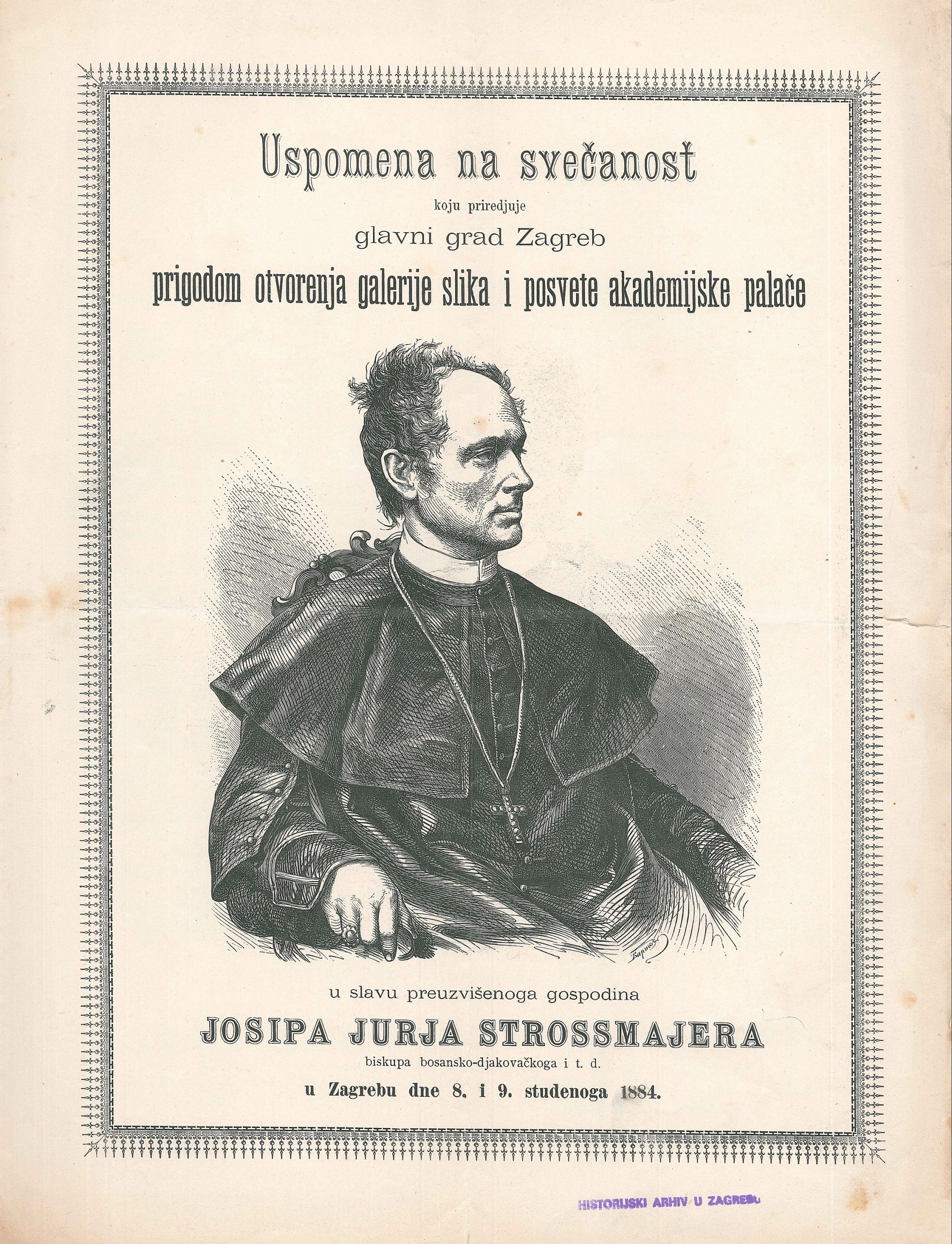Over one year had passed between the arrival of Strossmayer’s collection to Zagreb and its opening to the public. Because of the scaffolding construction, placement of paintings, painting of the palace walls, as well as the Bishop’s frequent delays and reluctance to even attend the grand opening – due to political unrest and his eventual falling out with Kršnjavi – the intended opening date of the gallery had changed multiple times in that period. When in October of 1884 he finally reached an agreement with Rački on the ceremony protocol and confirmed his arrival, Zagreb’s city representatives, along with local societies, decided to organize a grand reception for the Bishop with accompanying events. This postponed the grand opening until the beginning of November, which luckily coincided with the anniversary of the Great Earthquake.
[…] a boiling pot of volcanic stew was being prepared for us on the morning of the 9th, when it shook our mountains and cities, destroyed our houses, tore down our chimneys and roofs, and planted a horrible seed of fear into our bodies and souls. Who does not remember that day when the entire populace of the capital lost its consciousness in indescribable agitation, bemusedly roaming the streets and squares, or fleeing in thousands on foot and by carriage, when a spot on the train could not be found. Few where those who heroically stayed, lest for some nervousness, in the unfortunate city, and did not sink in their spirits, but comforted and encouraged already frightened ghosts.
It has been four years since that day of reckoning. And today a recovered Zagreb prepares for tomorrow in glorious joy for a grand occasion; foreigners are coming to bear witness and participate in the celebration with which the capital receives the generous son of its people. Even if this claim of integrity will prove repulsive to those who have turned their backs on the city, it must be said that all tiers of the capital’s populace have worked hard to prepare a grand day for the arrival of a man who has sacrificed his whole life’s work for the most notable of our cultural institutions. The Ninth of November 1880 was a day of misfortune not only for Zagreb, but the whole nation. Let the Ninth of November 1884 be a glorious day of wonderful memories, a day of the people’s gratitude to their patron, may the Lord protect him for years to come. […](from: “The day of 8th November 1880”, Pozor, 8th November 1884)
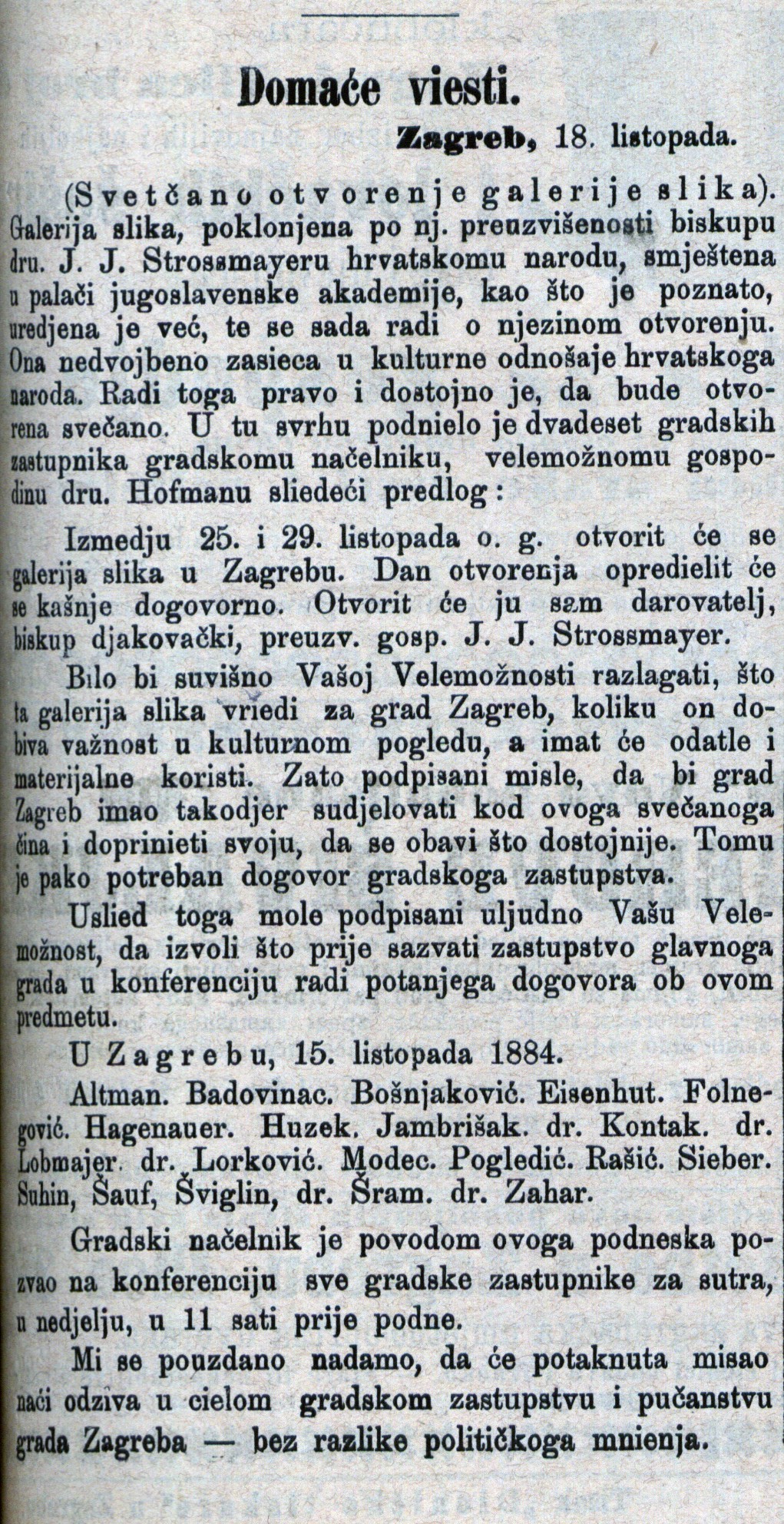
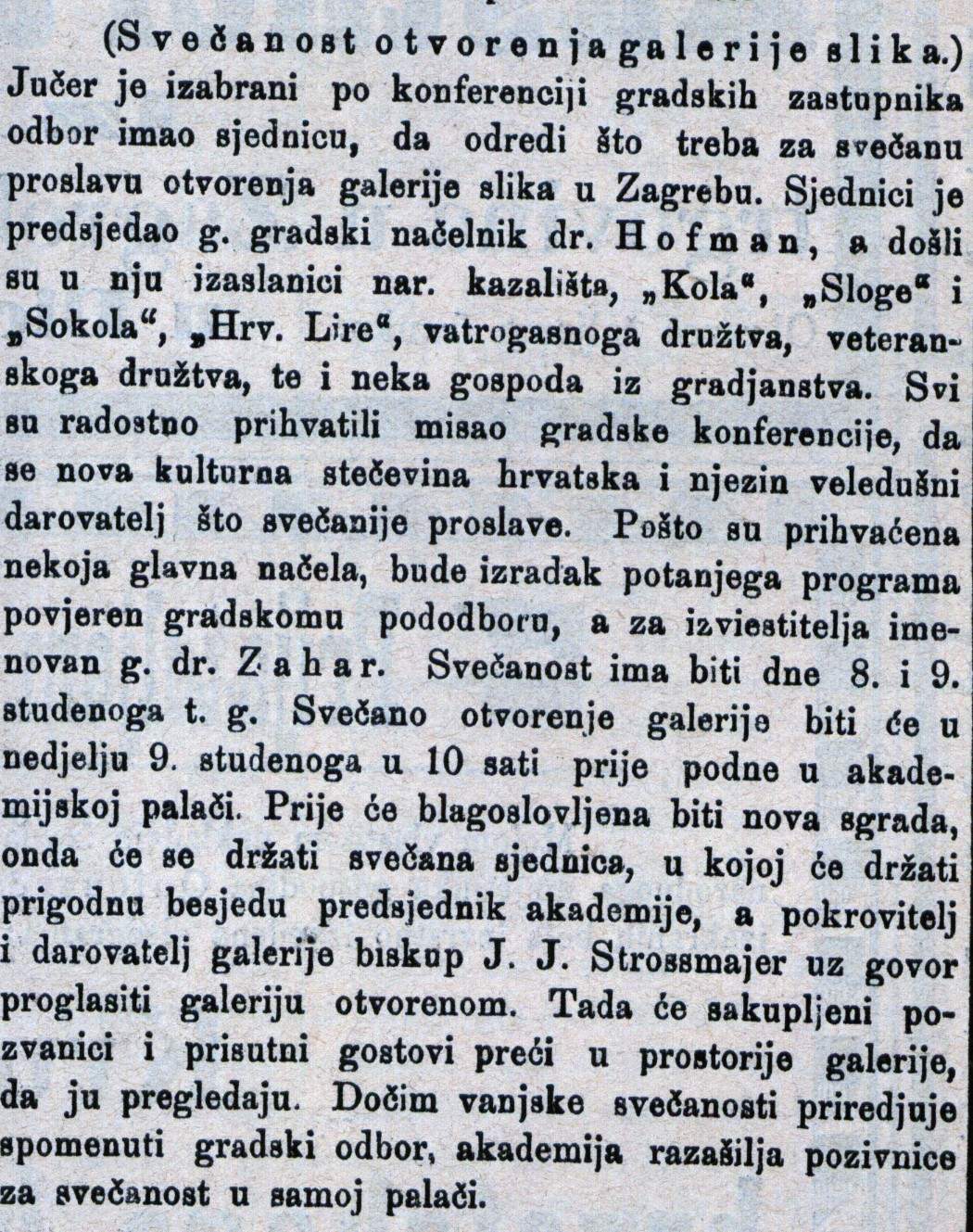

Esteemed sir!
As I have previously telegrammed you, the opening of the Gallery has been postponed for the 8th and 9th of November. This is according to the wishes of the City Council’s committee, which has been chosen to organize the festivities. As you will see in the program which will be published in the newspapers, the city is preparing a glorious reception for you. This is of necessity, so that the people will learn to give credit where credit is due. Therefore, you cannot refuse the sacrifice of organizing a trip to Zagreb by train from Osijek. The train arrives to Zagreb at around 10 o’clock in the morning. The mayor, along with representatives of the city and societies, etc. will be waiting for you at the railway station. It seems to me that it would be most convenient if you were to stay overnight in Zákánj or in Koprivnica at Beruta, in which case it would be opportune to telegram him. On the night of the 8th, the city will be lit, and the citizens waiting for you with torchlight. On the 9th at 10 o’clock, there will be a house blessing, at which the societies will organize a choir, composed after Zajc. This will be followed by a grand session with yourself and myself included. That night will see a concert and dinner. Baron Vranyczany is organizing a ducal suite for you. He also intends to entertain while you are staying with him, at noon and in the evening. The celebration will be endowed with a national and cultural character, so that all who are friends of our education can participate, regardless of their political affiliation. May your conduct also be a reflection of this aim. Compromised persons will not be allowed to approach, but cannot be banned from attending in an official capacity, such as Vončina, etc. […](Rački to Strossmayer, 26th October 1884, from: The Rački-Strossmayer correspondence, letter no. 851)
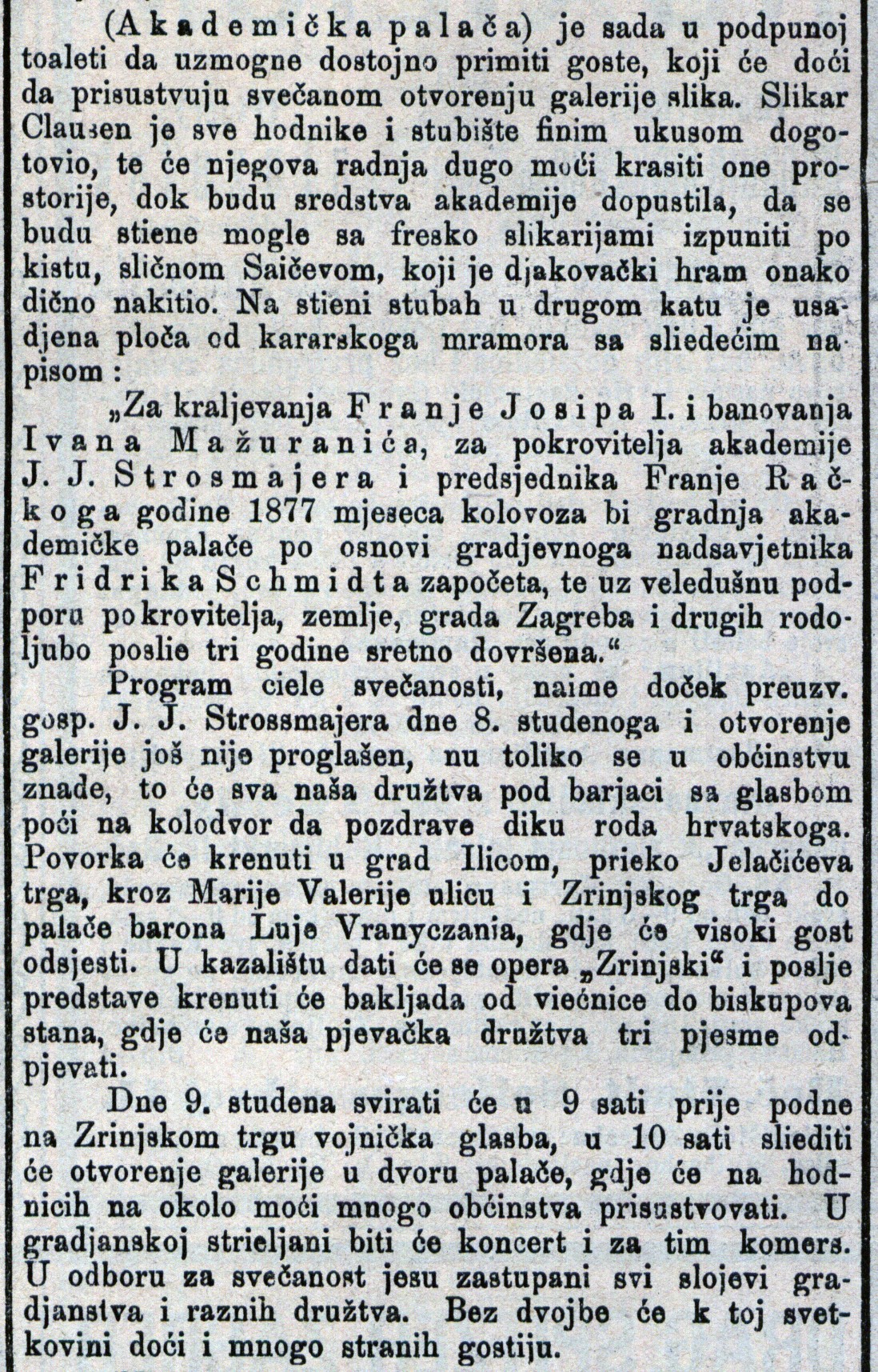
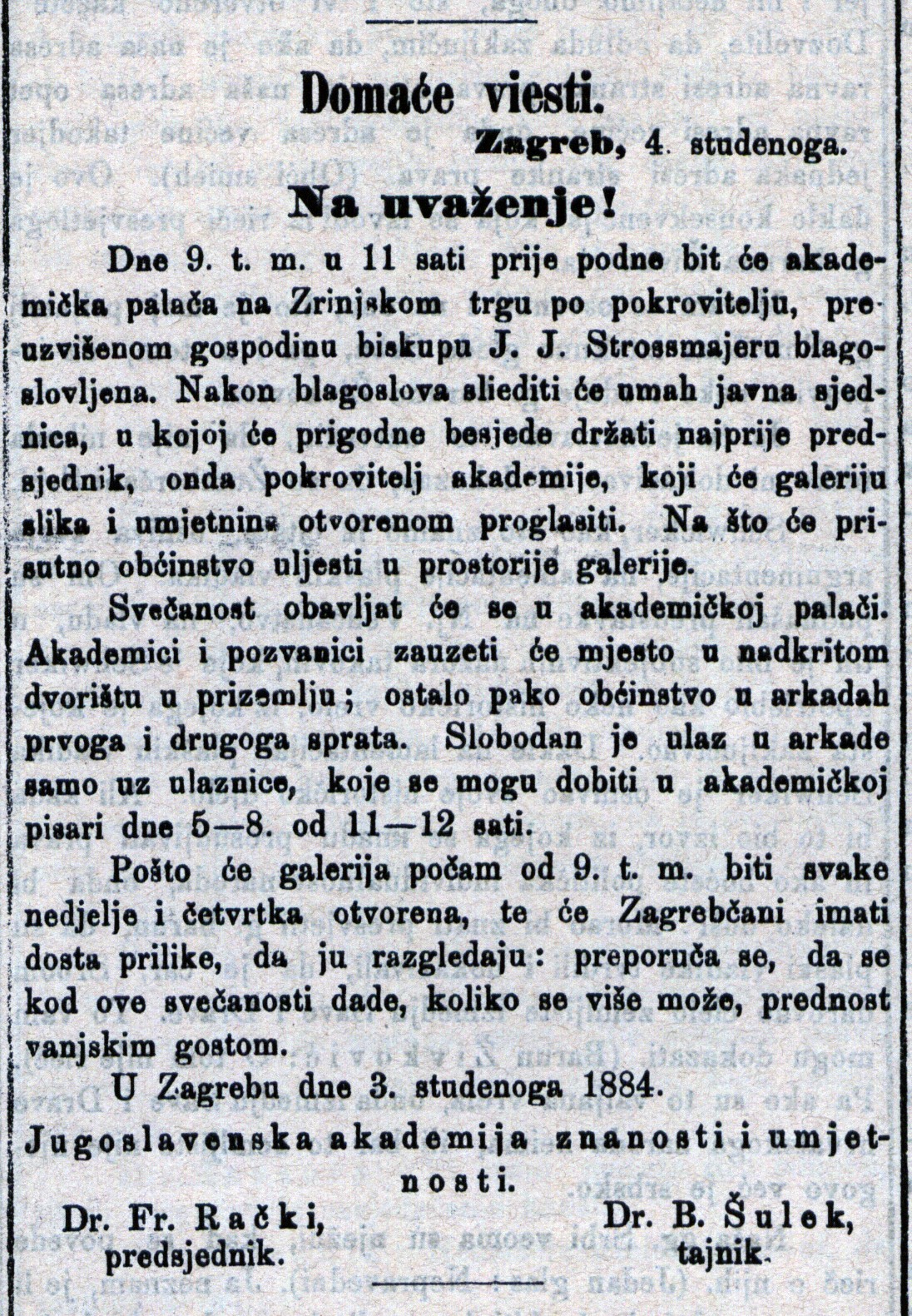
Deliberations of the committee for the grand opening of the gallery of pictures have gotten to the point where a declaration will soon be published for the Zagreb public, which will invite the public to participate in the festivities, but also inform them of the celebration program.(from: “Towards the opening of the picture gallery”, The Official Gazette, 3rd November 1884)
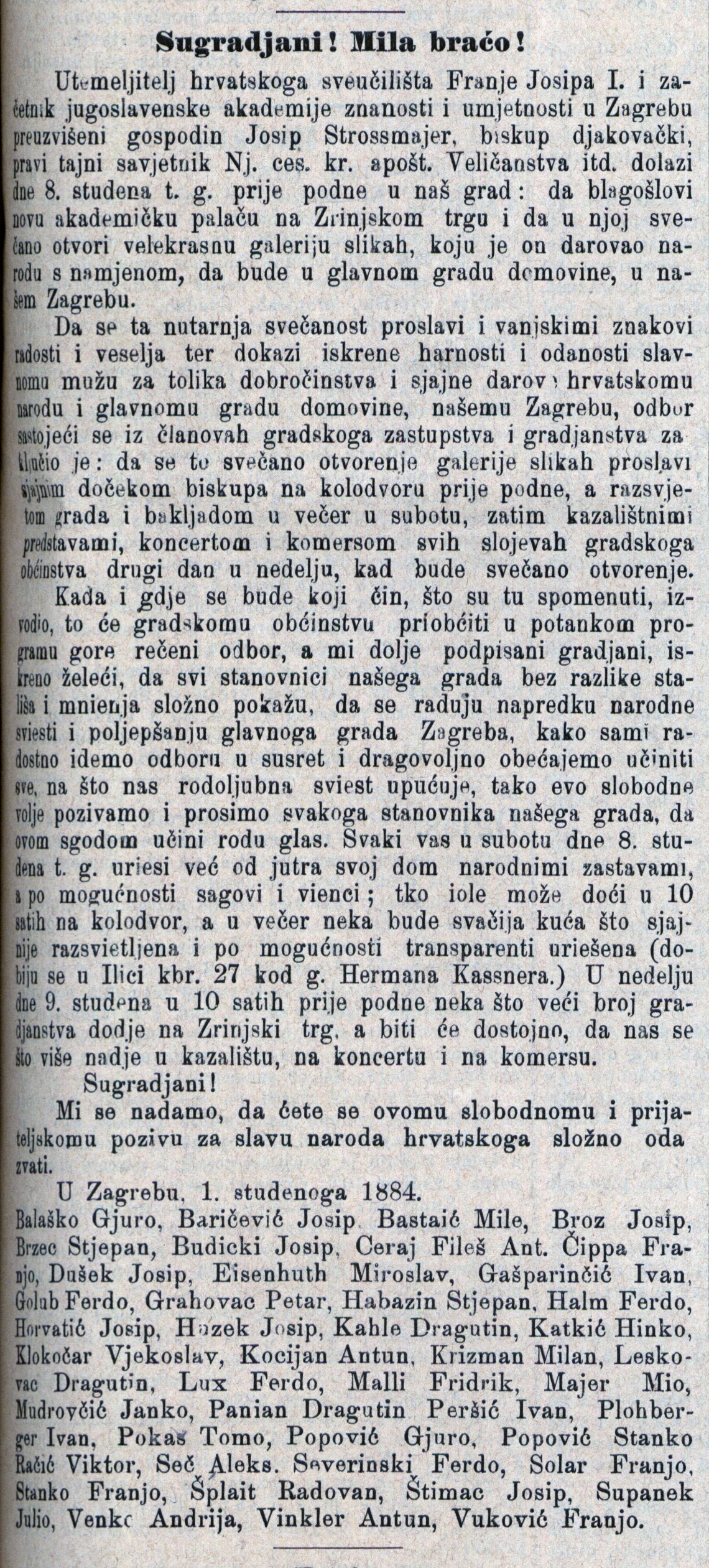
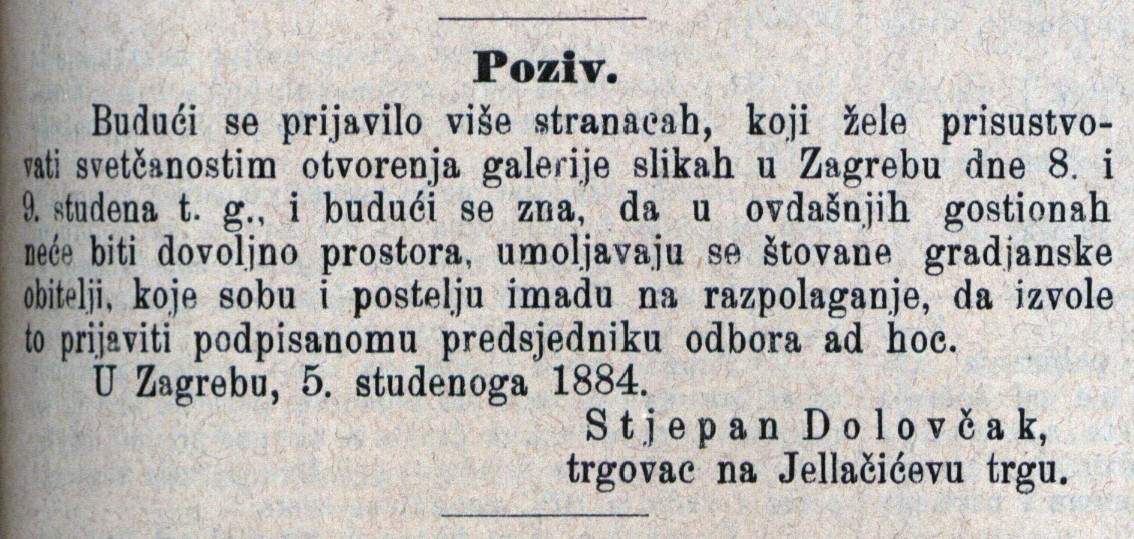

[…] In Zagreb, where all of this is known by young and old, male and female, rich and poor, preparations are on the way for the celebration. The motto under which preparations are made is: during Strossmayer’s stay in Zagreb, lady politics has been banned from the city’s territory. This cantankerous hag, which causes feuds among brothers, will give way to the gentle scepter of the goddess of eternal youth, education, around whom gather even those nations whose political quarrels are perhaps not more severe, but neither more lenient than those in Croatia. […](a transcript of a part of the above text)

On 7th November, one day before Strossmayer’s arrival to Zagreb, the city’s delegation headed by the great ex-prefect, Dragutin Pogledić, departed for the town of Zákány in Međimurje in order to welcome their esteemed guest and escort him to his destination. The delegation included the following members: Žiga Badovinac, Antun Eisenhut, Miroslav Eisenhut, Ferdo Kalabar, Mirko Karas, Vilim Lovrenčić, Ivan Plochberger, Franjo Sollar, Milan Stanković, and Antun Nossan. Gjuro Pilar and Tadija Smičiklas were sent on behalf of the Academy to greet the Bishop, and Ivan Zahar was sent as the representative of the city’s organizing committee. Contemporary newspapers wrote that a special “salon wagon” was asked for by telegram to transport the valued guest and his escort to their destination, but this plan fell through.
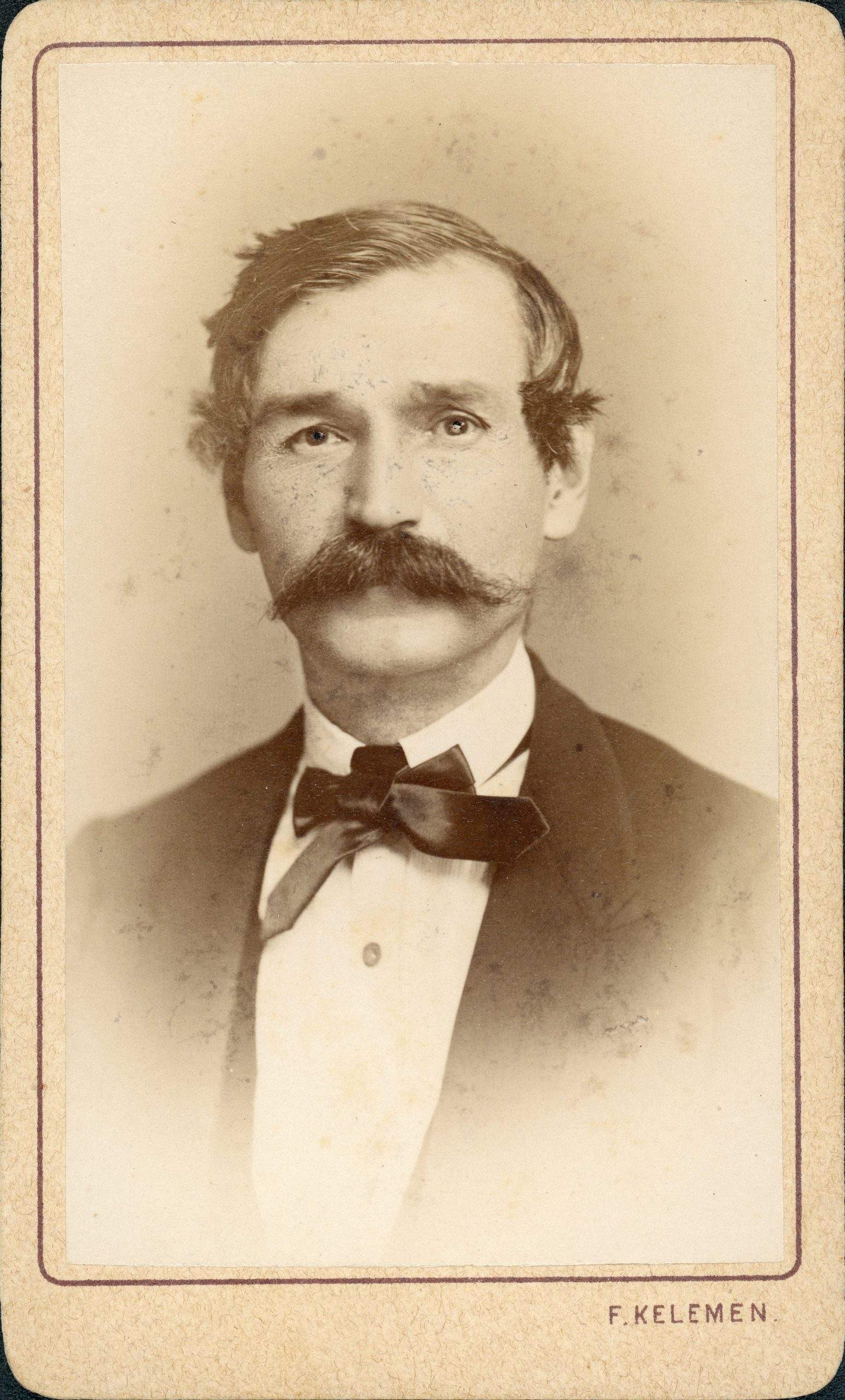
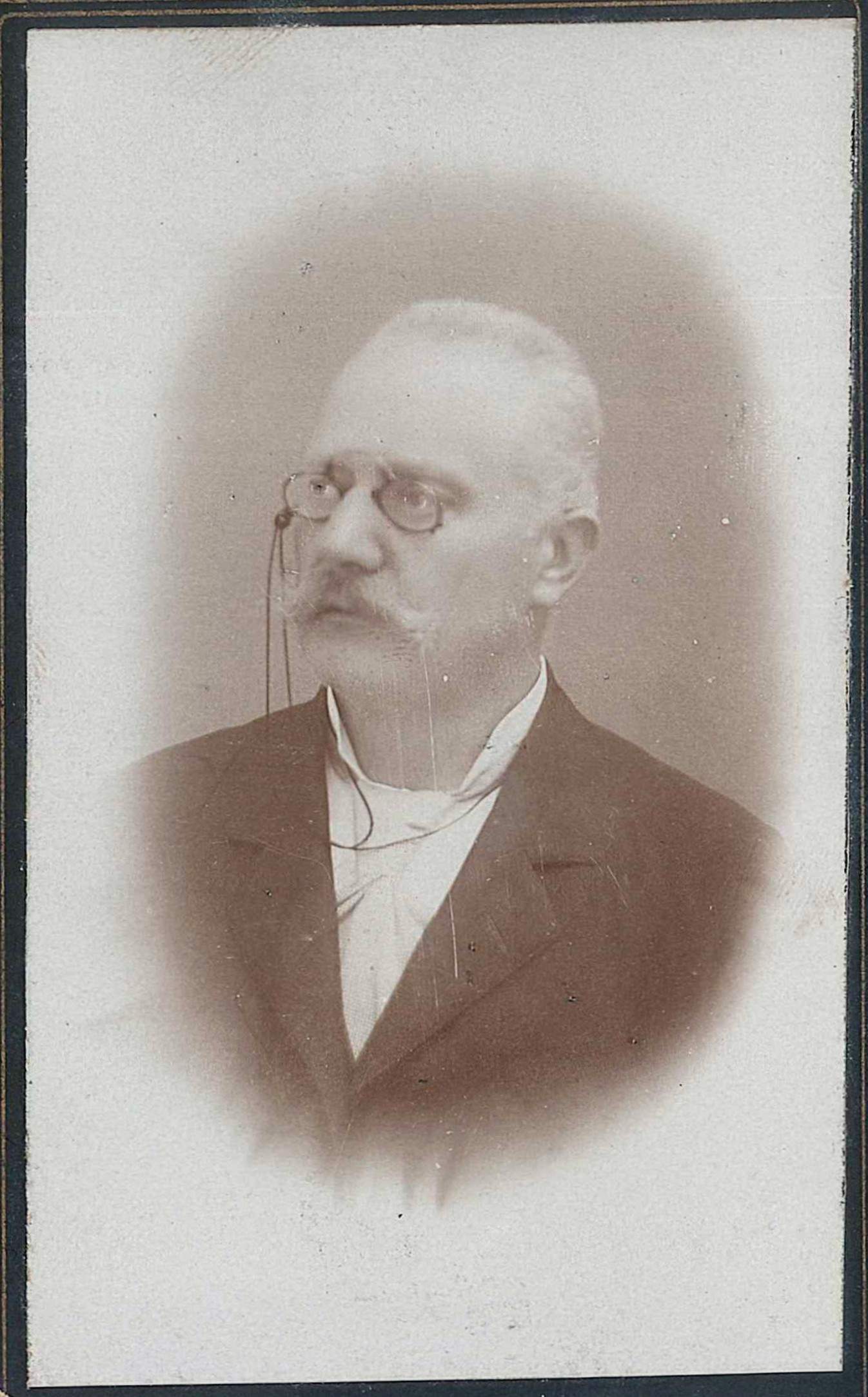
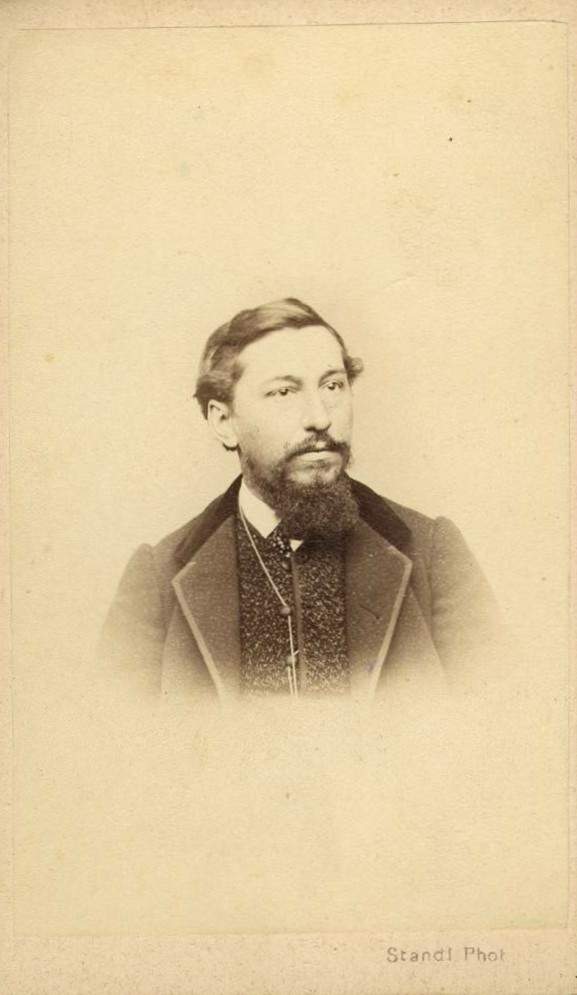
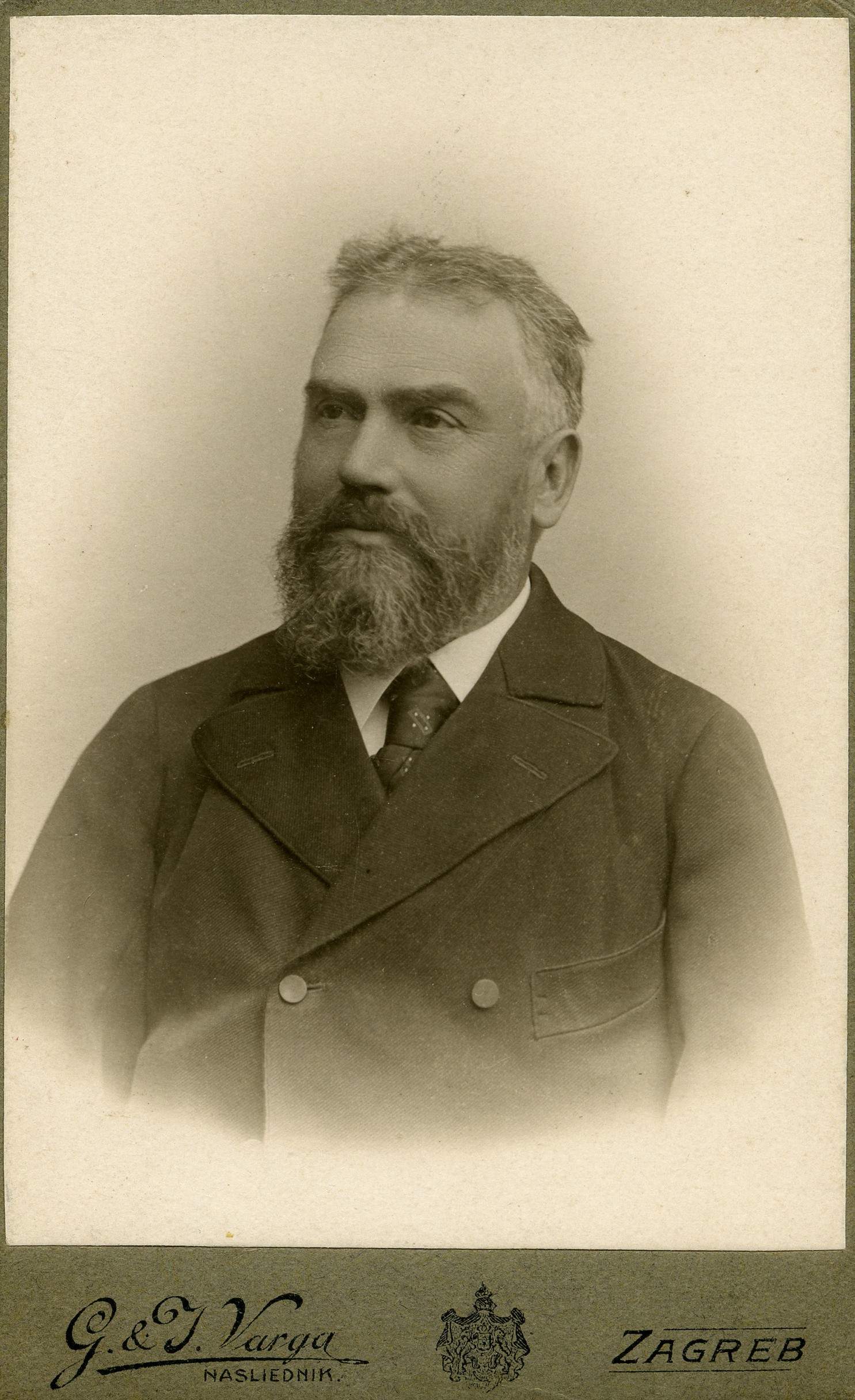
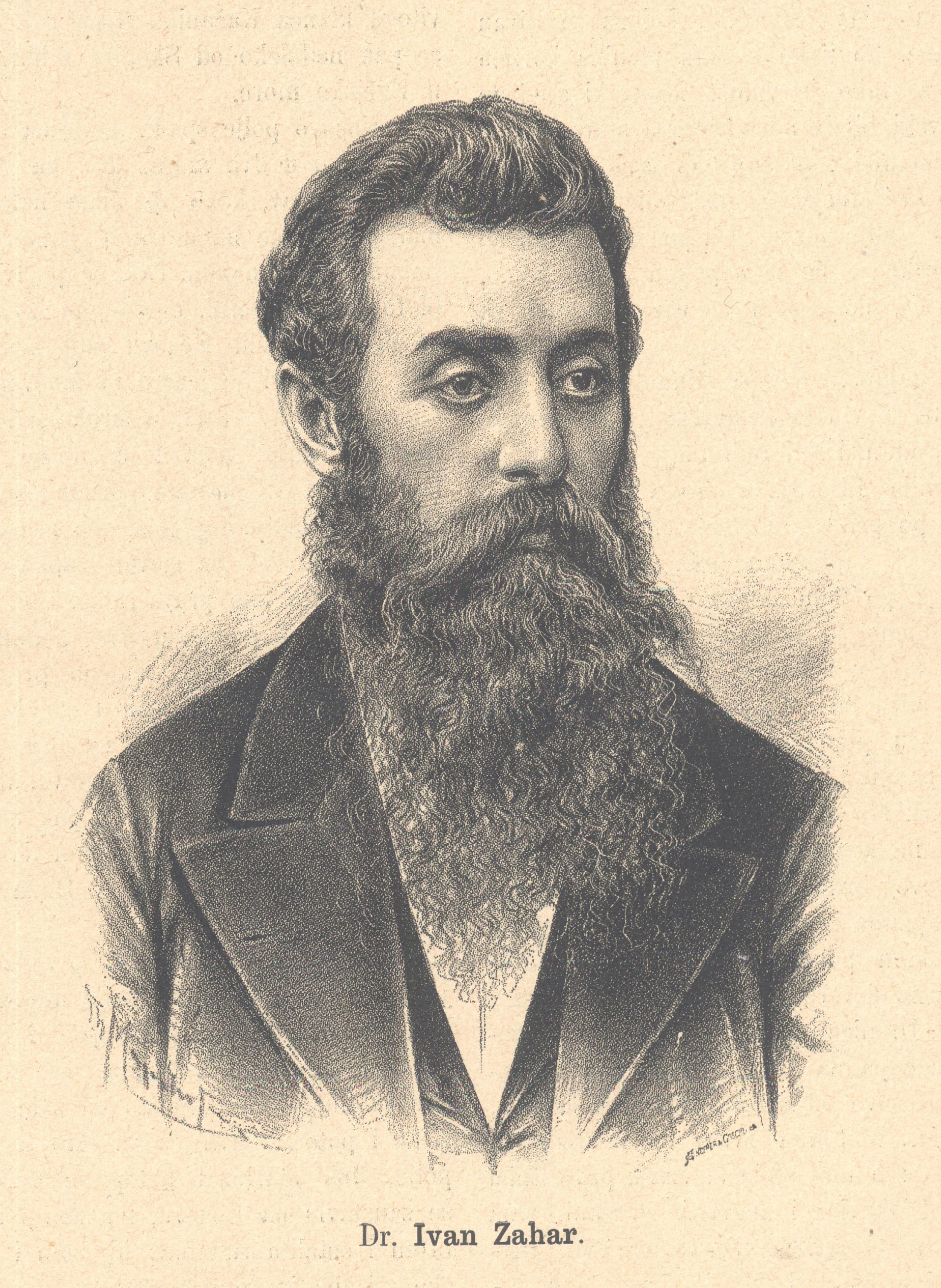
The delegation of Zagreb’s citizens welcomed His Eminence, Bishop Strossmayer, in Zakon, where he arrived at 6 ¼ this morning with his secretary, venerable Mr. Cepelić. Committee members in formal attire awaited the guests in the waiting room of the 1st class, where esteemed Mr. Pogledić welcomed the Bishop with a short speech, expressing that the capital’s citizens admire and love him. This delegation was so honored to have had the opportunity to welcome and escort the pride of the Croatian people to the capital. His Eminence was overjoyed with the attention he had received and thanked the delegates with lovely words of gratitude. At 6 ¾ the train departed from Zakon, but without a first-class carriage, even though the railway clerk had but an hour before reported to the committee that the salon was ready and had also taken money for it.(from: “The reception of Bishop Strossmayer”, Pozor, 8th November 1884)
The duration of a passenger train’s trip from Zákány to Zagreb, on what was known at the time as the Zákány-Zagreb railway, was around four hours. This final leg of Strossmayer’s journey included the stations in: Koprivnica, Lepavina, Križevci, Vrbovec, Dugo Selo, Sesvete, where he was warmly welcomed by the gathered crowd, especially in Križevci and Sesvete.

The train arrived at around 10:30 in the morning to the Southern railway station, which had been Zagreb’s main railway station until the completion of the State station (today’s Main station) in the year 1882. The Bishop was welcomed by as many as several thousand citizens. The reception was not organized at the platform, but in front of a pavilion raised in front of the station, which was adorned with flowers and tapestries for the occasion.
The committee for celebratory activities could not get a platform on which to organize a reception, deciding instead to raise a special pavilion in the square in front of the station. In only 24 hours, a charming cottage was built with great taste and excellent décor, with carpets and exotic flowers, in which busts of His Majesty King Franz Joseph and Queen Elizabeth were placed. The entire square was adorned with nine great flags and decorated ceremoniously.(from: “The reception of Bishop Strossmayer”, Pozor, 8th November 1884)
Thanks are due to the railway administration for not allowing us to hold the reception at the platform, as this would have deprived us of the improvised, but nonetheless magnificent sight in front of the station, in the pavilion where all could gather so picturesquely. If left on the platform, with all its hustle of wagons and locomotives, all the poetry of the ceremonious sight would have faded away, as only a handful of chosen guests would have been able to attend. […](from: “Glorious days”, Pozor, 11th November 1884)

[…] With the conclusion arrived at on 12th November, the City Council has gifted the skating society (I. H. S. D.), on their appeal, with the beautiful pavilion that the municipality had raised at its own expense at the Southern railway station, for the occasion of welcoming Bishop Josip Juraj Strossmayer. Thus, the society has instantly transferred the pavilion to the skating rink, making it more beautiful and practical than the previous old shack. The pavilion will provide a place for musicians on Sundays.(from: F. Bučar, A memento of the Zagreb skating society: 1877-1931, 1931)
Flags were raised along the square in front of the railway station. In a semicircle around the improvised structure, all of the city’s societies were gathered, preceded by the fire brigade’s orchestra: the Gymnastic society Sokol, the academic singing society Hrvatska lira wearing Croatian caps (Cro. hrvatke), numerous students and faculty from the University carrying their school’s flags, the Typographical singing society Sloga, the Croatian singing society Kolo, the Mercantile society Merkur, the City firing range society, usually rarely present at ceremonial gatherings, the Workers’ singing society Sloboda, Samobor music, the Society of war veterans, the Workers’ society of stonemasons and carpenters, and guilds from the city. Delegations from other Croatian cities also participated in the reception: Rijeka, Bakar, Sisak, Karlovac, Križevci, Jastrebarsko, as well as Ljubljana in Slovenia.
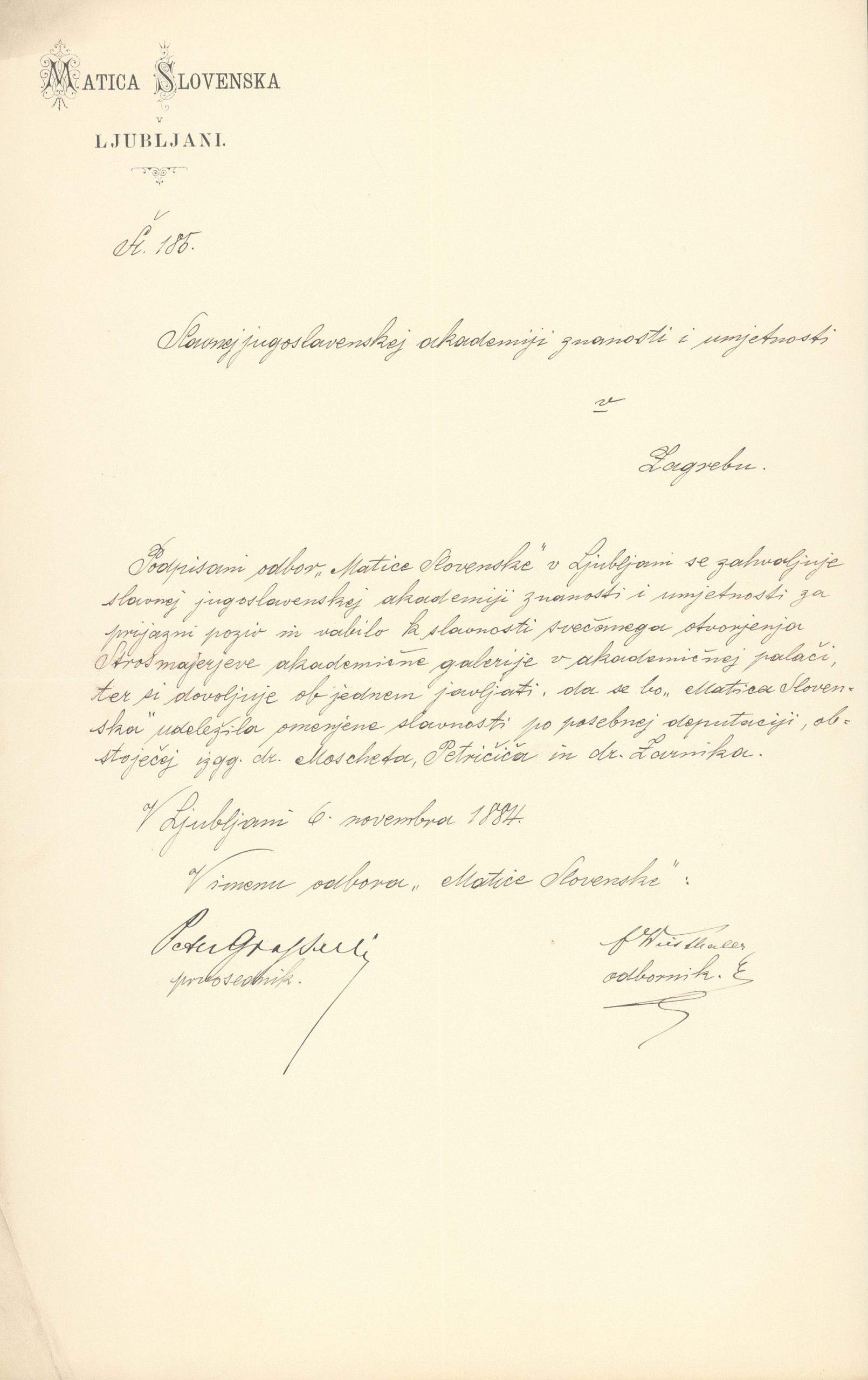
The esteemed guest, accompanied by deputy mayor, Mr. Gjuro Crnadak, University professor, com. Kosta Vojnović, presidents of various societies, members of the Yugoslav Academy and Croatian Heritage Foundation, city councilors, and others, headed to the pavilion, where Mr. Crndak welcomed him with more or less the following speech:
“Esteemed sir! The capital City of Zagreb considers itself and its inhabitants very lucky to be able to welcome Your Eminence in our company. The Croatian people consider Your Eminence to be their great benefactor. Your charity has been mostly enjoyed by our capital, Zagreb, which is why this city accepts any opportunity to show its deepest respect to Your Eminence. The founder of the Yugoslav Academy and of the University of Franz Joseph I, which has been brought to life by the will and mercy of our His Highness the King, is the joyous reason for which Zagreb dons its ceremonial suit today, in order to celebrate the opening of the picture gallery that Your Eminence has bestowed upon the Croatian people. May Your Eminence be convinced that the Croatian people will venerate their benefactor and great patriot as long as he may live, and that his glory and memory will never be erased from their hearts. Hurrah!”
At these words, the crowd cheered loudly: Hurrah!
The esteemed Bishop Strossmayer, answering the welcome speech said in a deeply moved voice: “To your love, I give love in return, to your friendship, I return friendship also, respect I pay with respect. With this I can only assure you that, for as long as there is life in me, I will always work for our faith, our country, and for this cherished city of Zagreb.”(speeches by deputy mayor Crnadak and Bishop Strossmayer, from: “Towards the opening of the picture gallery“, The Official Gazette, 8th November 1884)
After the welcome speech by deputy mayor Crnadak and the Bishop’s acknowledgement, distinguished guests left the square in a procession of carriages. Despite the large number of gathered people – more than five thousand citizens according to newspaper reports – chaos was avoided among the crowd thanks to good organization, which allowed the carriages to pass freely.


